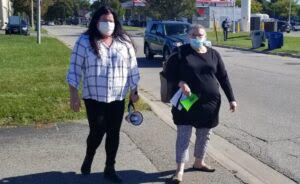EVENT: Quick Cross-Ontario Summary & Media from Powerful Day of Action for LTC
Posted: October 16, 2020
(October 16, 2020)
Congratulations on a Powerful Day of Action for Long-Term Care
See just a small sampling of the media coverage from communities across the province below, including heart-wrenching stories from residents’ families and care workers. Thank you all for helping to send a powerful message!!!
Our Day of Action for Long-Term Care on October 8 saw massive participation from across the province. Events were held in Almonte, Chatham, Dryden, Durham, Guelph, Hamilton, Haliburton, Kawartha Lakes, Kingston, Kitchener/Waterloo, London, Newmarket, Niagara, Oakville, Oxford, Peel, Peterborough, Sault Ste. Marie, Scarborough, Sudbury, Thunder Bay, and Windsor following public health guidelines, with lots of support. Family members who lost loved ones or who currently had loved ones in long-term care homes spoke of their heart-breaking experiences, and staff spoke of the monstrous challenges they faced in caring for residents. Very visual car cavalcades were also held in many of these towns, and reportedly there were lots of people honking in support. There is no doubt that the public is supportive of our call for the Ford government to improve care and staffing levels, end for-profit care and bring in a mandatory staffing standard. Toronto and Ottawa held their press conferences online, in lieu of public gatherings. All across the province, the events were widely reported by local media, as you will see below. The events were sponsored by 38 organizations, as well as Health Coalitions throughout Ontario.
Check out the Facebook album here.
To have pictures added to the album, please email them to ohc@sympatico.ca.
If you like our work, please help support it if you can: donate here.
Almonte

Workers, families hold protest for long-term care changes
By Julie Ireton, CBC News, October 8 2020
Amy Ayers, a personal support worker at Almonte Country Haven, has worked throughout the pandemic, except for 14 days when she was sick with COVID-19 herself. (Francis Ferland/CBC)
Workers, unions and families gathered in Almonte, Ont., Thursday to call for immediate action by the Ford government to recruit staff and to improve working conditions in Ontario’s long-term care homes. Amy Ayers, a personal support worker at Almonte Country Haven who helped organize the day of action, has been at the long-term care facility throughout the COVID-19 pandemic, and she even contracted the virus herself last spring. “What we’re doing here is coming out to make people who are unaware, aware of the crisis in long-term care centres,” said Ayers.
Similar protests happened in more than 20 municipalities across Ontario.
Last spring, 72 of 82 residents, along with several staff members at Almonte Country Haven, tested positive for COVID-19. There are currently no cases in the long-term care home right now.
“I’m kind of coming out of my shell to speak up about the very damaged system and I hear a lot from coworkers, other PSWs … they’re afraid to come out, talk and stand up for what they believe is right. So I’m here to say, it’s OK,” said Ayers.
More needs to be done
The Ontario Health Coalition said the problems include understaffing, testing backlogs, sharing of four-person rooms, and insufficient infection control provisions. It’s calling for a minimum daily standard of four hours of hands-on care for every resident. Ayers says a lot of lessons have been learned, but more is needed across the care system.
“Number one would be more staffing per ratio of residents. With that we can give more quality of care,” said Ayers. “Our elderly in long term care deserve better. They deserve to have top notch care. I can’t stress that part enough.”
Mae Wilson lived at Almonte Country Haven for four years until she died of COVID-19 in May.Her daughter, Karen Thompson, attended the day of action with her own signs and ideas about how the system can be improved now. “We have to make the system better. We’re going into the second wave, and we haven’t really done a thing to make it better,” said Thompson.
Patient ombudsman report
The day of action for long term care in Ontario happened on the same day as the province’s patient ombudsman released a report. The report details complaints about the safety of residents and staff and points to a crisis in the province’s long-term care homes.
At Queen’s Park on Thursday, Ontario’s minister of long-term care, Merilee Fullerton was asked when changes in nursing homes can be expected. “Staffing is a priority and our government is putting dollars behind that as we speak,” said Fullerton in the legislature.
Karen Thompson hopes the system improves but she is worried that the government doesn’t have an accurate account of what’s going on inside many care homes because workers like Amy Ayers who speak out, are rare. “Everyone clams up. I know a lot of the PSWs. They say everything is fine. They just can’t talk. They’re afraid to say stuff and then get in trouble later and get fired,” said Thompson.
All in a Day with Alan Neal: Oct. 8, 2020: Personal Support Workers say LTC’s are xxx
Carleton Place Almonte Canadian Gazette: ‘We need to put the pressure on’: Fight continues for long-term care changes with Almonte day of action
Chatham
Rally Calls For Long Term Care Help
By 99.1 FM CKXS, October 9, 2020
Unifor Local 127 President Nicole Grainger with chair of the local Ontario Health Coalition, Shirley Roebuck. Photo credit: Chris Taylor. Health care advocates are calling on the provincial government to do more to protect residents in long term care.
A small rally was held in front of MPP Rick Nicholls’ Chatham constituency office yesterday with a motorcade of vehicles circling by the Heritage Road building, honking their horns.
Last week, the province announced more than half a billion dollars to help long term care hire workers and purchase more equipment, but Shirley Roebuck, chair of the local chapter of the Ontario Health Coalition, says that’s still not enough.
“It doesn’t matter if you’re making a bad wage or a good wage, if there’s only an insignificant or inadequate number of people to take care of our folks in long term care, then the residents are going to suffer,” Roebuck says.
Nicole Grainger, president of Unifor Local 127 says attracting new people to train as personal support workers is a challenge.
“I believe it’s gotten a bad rep because of the burnout, the lack of staffing, the lack of vacations,” Grainger says. “People don’t want to go into that department in that industry because you’re not guaranteed to finish. You could come out injured, you could never get time off the job, and you could work around the clock and it still wouldn’t be enough.”
The Ontario Health Coalition demands the Ford government recruit and train more staff and provide a minimum daily standard of four hours of hands-on care for every resident.
Staff shortages heighten concern if COVID outbreak hits C-K long-term care homes
By Ellwood Shreve, Chatham Daily News, October 8 2020
Chatham-Kent has, so far, avoided a COVID-19 outbreak at any of its long-term care homes but, due to staff shortages and burnout, a health-care advocate and union official fear the result if it does happen.
“Although there have not been any COVID-19 outbreaks, the bad conditions are still there,” said Shirley Roebuck, chair of the Chatham-Kent, Wallaceburg, Walpole First Nation and Sarnia chapters of the Ontario Health Coalition during a protest Thursday at the Chatham constituency office of Chatham-Kent-Leamington MPP Rick Nicholls.
“It’s very scary” said Unifor Local 127 president Nicole Grainger of the thought of an outbreak happening locally because long-term care facilities are already short-staffed.
The local health coalition chapters were part of a provincial day of action that occurred in several communities across Ontario to call on the provincial government to take immediate action to address a staffing crisis and improve staffing ratios to implement a minimum of four hours care for long-term care residents, as well as end for-profit facilities.
Roebuck said the day of action is to “make everyone aware that, despite the provincial government’s announcement of significant funding, they haven’t done anything to increase the number of (personal support workers) available for work.”
She said the health coalition is pleased wages have increased but noted residents will still suffer if there isn’t enough people to provide care.
“COVID-19 exposed the conditions in long-term care, but they have been there for years,” Roebuck said.
The Ontario Health Coalition says more than 1,900 Ontario residents and staff have died of COVID-19 in long-term care.
Grainger said workers in all departments in car homes are routinely working short-staffed, especially personal support workers.
“There’s not even enough bodies to fill the staffing needs, let along giving out vacations,” she said.
Staff are only getting time off unless they are on a medical leave, she added.
The long-term care industry has expressed a desire to hire more personal support workers, but there is little interest among the workforce to do this type of work.
Grainger believes this is due to publicity surrounding the poor pay and working conditions.
Roebuck said employers need to start offering full-time positions with suitable benefits.
It can take several years of working part time before someone can get a full-time job in the long-term care industry, she said.
Grainger said she’s finally secured a full time position after working 15 years in the industry.
“It’s got to change from precarious work,” she said.
A request for comment from MPP Rick Nicholls office was not returned by press time.
Earlier this year, the provincial government announced $243 million in emergency funding for staffing, supplies and capacity, along with another $78.2 million to preserve front-line staff and maintain current levels of service provided for resident care and accommodation.
Grainger said employers need to be more innovative, citing her employer, Riverview Gardens, has a program where it covers the schooling for someone willing to become a personal support worker, as well as pays them to go to school.
She noted 11 people are currently in that program.
Judy Wolanski, a retired nurse who took part in the local protest that saw several vehicles drive around Nicholls’ constituency office, is worried about her step-father, who is in long-term care.
She told reporters she’s often seen staff work while injured because they refuse to add to the workload of their colleagues.
“They really care about each other,” Wolanski said.
The delays involved in requiring a COVID test in order to visit a care facility means Wolanski can only see her step-dad every one or two weeks.
She’s seen a difference in him.
“He’s not as focused when you talk to him. He lacks that stimulation,” Wolanski said. “I’m worried the homes will lock down again in the coming second wave and how this will impact residents, staff and family members.”
Dryden
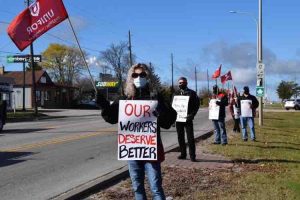
Long-term care workers lobby for improvements
By Mike Aiken, Dryden Now, October 8 2020
Long-term care workers in Dryden took part in a province-wide rally.
Katrina Peterson is a Unifor member, who works in long-term care. She’s helping to lead a rally in Dryden that’s part of a province-wide lobbying effort to get the Queen’s Park to improve conditions in facilities, as we enter the second wave of the pandemic.
“Their PR work is great. They’ve been out in the news throwing all this money out there. It looks good, but it really isn’t the dollar amount we need to fix long-term care. It’s just a quick-fix. It isn’t going to fix long-term care permanently,” Peterson emphasized.
Union members say they spend five or six minutes with residents in the morning, but they would like to be able to spend more like four hours a day with residents.
“With the first wave, it looked like maybe they could see what was happening in long-term care, but we don’t see any push again for ending for-profit organizations,” she said this morning.
During the first wave, 81 per cent of COVID-19 deaths were linked to long-term care homes.
According to the Canadian Medical Association Journal, the analysis included:
- all 623 Ontario LTC homes
- comprising 75,676 residents
- 360 LTC homes (57.7%) were for profit
- 162 (26.0%) were nonprofit
- 101 (16.2%) were municipal homes
- 190 (30.5%) outbreaks of COVID-19 in LTC homes
- involving 5,218 residents
- resulting in 1,452 deaths
- with an overall case fatality rate of 27.8%.
Guelph

Ontario Health Coalition calls for overhaul of long term care (4 photos)
By Kenneth Armstrong, GuelphToday.com, October 8 2020
Advocacy groups and unions representing the health care sector are calling on the provincial government do much more when it comes to protecting people living in long term care, as well demanding a halt to creeping privatization of health care in Ontario.
On Thursday morning the Ontario Health Coalition held a press conference on Norfolk Street in Guelph in partnership with CUPE Local 57 and Concerned Friends of Ontario Citizens in Long Term Care Facilities. It was part of a ‘day of action’ with similar events being held across Ontario and in Toronto at Queen’s Park.
The backdrop for the Guelph press conference was Norfolk Manor, a privately owned retirement residence that was the site of a COVID-19 outbreak which saw 22 people infected before it was reported as over in mid May.
“Seven people died here. That’s significant,” said Magee McGuire, co-chair Ontario Health Coalition Guelph Wellington.
A press release sent on the event said the fact it was being held in the shadow of a private long term care facility hit hard by COVID was “coincidental.”
Norfolk Manor did not immediately reply to a request for comment.
In total, over 1,900 people living in long term care facilities in Ontario died as a result of COVID-19.
CUPE Local 57 president Linda Pellegrini said many of the people who contracted COVID-19 in long term care homes in Ontario were not taken to hospital.
“In the first phase of COVID-19 very few long term care residents who (contracted) COVID-19 were transported to hospitals to protect precious hospital beds and resources for younger people,” said Pellegrini.
She called the number of COVID-19 deaths among long term care residents appalling. She wants to see residents who are infected with the disease in the future cared for in hospital.
“These women and men built this country and deserve that at the very least,” said Pellegrini.
The Ontario Health Coalition and CUPE is asking the Ontario government to pass the Time to Care Act, a private members bill which calls for a minimum of four hours of care per long term care resident every day.
“For the sake and wellbeing of the thousands of people in long term care we demand a minimum standard of care,” said Pellegrini.
McGuire said the coalition is also asking the government to phase out private long term care facilities and return Ontario to a system that is publicly funded.
About three quarters of the COVID-19 deaths in long term care homes occurred in privately owned and operated LTC facilities, said Pellegrini.
Nicol said there is a difference in the level of care received by residents between publicly and privately funded models for long term care.
“If it is publicly paid there is a different standard than the ones that are privately paid,” she said.
The whole system needs an overhaul, said Laurie Nicol, vice-president of Concerned Friends of Ontario Citizens in Long Term Care Facilities.
Concerned Friends has been advocating on behalf of long term care residents since it was formed in 1980. She said there has always been issues with the system, with staffing shortages in long term care facilities being identified as critical far before the pandemic took hold earlier this year.
“The tragic loss of our loved ones due to COVID-19 merely brought it to the attention of the general public and the government,” said Nicol. “Four hours of minimum care is only one piece of a strategy that needs to be developed for how we care four our elderly.”
Nicol is calling for the Ministry of Health and Long Term Care to bring back annual inspections of the province’s 627 long term care facilities.
The practice of annual inspections for every facility was cancelled in 2018, shortly after Premier Doug Ford’s Ontario PC government took office. Nicol said only eight were completed by the ministry in 2019.
Although the annual inspections were cancelled, the ministry still conducts critical incident inspections in response to complaints or injuries.
Nicol said her group audits those inspections and has seen an increase in compliance orders and director referrals as a result of those critical incident inspections since the annual inspections were cancelled.
Concerned Friends was also a member of the resident quality inspection advisory group which met quarterly to provide feedback to the ministry about inspections of long term care homes.
“When the Ford government took office the director of the long term care inspection branch notified us that the group was being disbanded,” said Nicol. “We believe there should be a resurrection of this advisory group with more accountability reporting directly to the minister of long term care.”
After a number of delays, Ontario’s independent Long Term Care COVID-19 Commission is expected to deliver its final report in April 2021.
“This is a political ploy to put off responsibility of the province to do the right thing during COVID to help our loved ones to get better, to have safe accommodation, food, care,” said McGuire.
She is also concerned the Ontario government plan for dealing with line ups at COVID-19 assessment centres is to introduce more privatization in health care in the province.
“Another is to pay pharmacies to do COVID testing while many of our hospital labs sit empty and they are already publicly paid for,” said McGuire.
She hopes newly-approved rapid testing will help the province to deal with the backlog of testing.
“These can help us rise to the challenge of these long line ups,” said McGuire.
Hamilton

Day of action for long-term care includes rally in Hamilton’s Gore Park
By John Rennison, Global News, October 8 2020
A union that represents staff in long-term care homes has participated in a “day of action.”
CUPE Ontario is stepping up its call for better pay for personal support workers, increased staffing in long-term care homes and an end to the privatization of long-term care beds.
Union president Fred Hahn also says it’s past time for approval of an NDP private member’s bill that would legislate a minimum standard of hands-on care for each long-term care resident in the province of at least four hours each day.
“We’ve been advocating for 15 years, by God, it should be the law of the land,” said Hahn.
CUPE Ontario participated in a series of more than 20 rallies across the province, organized by the Ontario Health Coalition as part of its “day of action,” including a “car caravan” at Hamilton’s Gore Park.
In voicing the union’s call for an end to the privatization of new long-term care beds, Hahn asked, “Do we really want to live in a country where we make money on our parents and our grandparents?”
According to CUPE, almost 2,000 residents and staff have died as a result of COVID-19 in Ontario’s long-term care homes since the start of the pandemic.
At the same time, Hahn says staff have had to fight for access to appropriate personal protective equipment (PPE) and have worked in “crisis-level staffing shortages.”
One of the province’s most devastating outbreaks, taking the lives of 16 residents, was at The Rossyln Retirement Residence in Hamilton’s east end.
The Rosslyn had its licence revoked by the Retirement Homes Regulatory Authority (RHRA) in mid-June.
CUPE Ontario and Ontario Health Coalition rally at Gore Park in support of long-term care workers
By John Rennison, The Hamilton Spectator, October 8 2020
CUPE Ontario president Fred Hahn calls on the provincial government to fix long-term care during a rally Thursday morning (Oct. 8) in Gore Park.
The rally by the CUPE Ontario and Ontario Health Coalition in Hamilton called on the government to improve wages for workers, hire more long-term care workers and institute a minimum number of hours of care per patient.
“Our members have had to be there holding people’s hands (through the pandemic). It’s very emotional for our members,” said CUPE Ontario president Fred Hahn at a rally in Gore Park Thursday.
“Our members have had to be there holding people’s hands (through the pandemic). It’s very emotional for our members,” said Hahn.
About 30 people were on hand for event. Other rallies were planned for across the province.
Haliburton
Local group pushing for better long-term care
By Joseph Quigley, The Highlander, October 1 2020
Locals are banding together to push for improvements to Ontario’s long-term care system and call for that care to be under the Canada Health Act.
The Haliburton-CKL Long-Term Care Coalition is a new public group made up of people from across both Haliburton and Kawartha Lakes. It formally announced itself Sept. 24 and seeks to address the deficiencies in long-term care made apparent by COVID-19.
Member Bonnie Roe said they feel bringing it into the Canada Health Act will help address those issues.
“There’s a real issue around the quality of care,” Roe said. “With COVID, it stretched staff, working hours, training. I think it’s just stretched people too thin.”
The coalition is also calling for an end to private, for-profit nursing home companies and a change in long-term care culture to become more resident-centred and rights-based. Roe said they have established contacts in other organizations, like the Ontario Health Coalition, with similar objectives. She said the group is getting a positive response.
“It affects everyone,” she said. “This issue is not new.”
Long-term care in the province came under scrutiny when the military, called in to assist amidst the pandemic, reported terrible conditions at some private long-term care homes. That prompted the province to launch an independent commission.
“Every publicly funded dollar and every dollar paid by the residents of long-term care should go to their care, not to profit corporate entities and their shareholders,” Haliburton member Brigitte Gebauer said in a press release.
Kawartha Lakes member and former federal NDP candidate Mike Perry said they have ambitious goals but there is a great need.
“We need to help our seniors, front-line workers, and families,” Perry said. “To build things back better, as any of us may need long-term care ourselves one day.”
The group is planning its first event in Haliburton Oct. 8, in solidarity with a day of action organized by the Ontario Health Coalition to call for long-term care improvements. Anyone interested in the group is encouraged to contact Roe at 705- 286-2414 or hcklongtermcarecoalition@gmail.com.
Roe said improved standards could help local care providers and prevent situations such as the roof leaks at the Highland Wood Long-Term Care Home in February 2019.
“We feel that the regulations, if they were under the Canada Health Act, would be for all long-term care facilities,” Roe said. “Hopefully, that would help prevent the issues.”
Kawartha Lakes

Kawartha Lakes Health Coalition calls for better staffing levels in long-term care
By William McGinn, The Lindsay Advocate, October 8 2020
Joining their provincial and national counterparts to demand action on the state of long-term care, the Kawartha Lakes Health Coalition (KLHC) said staffing levels must improve.
The KLHC joined the Ontario Health Coalition in a “Day of Action” for long-term care across Canada, and demanded the Ford government take immediate action.
Over 1,900 Ontario residents and staff in long-term care homes have died of COVID-19, and the coalition says many of these victims were without adequate care.
Bonnie Kennedy, co-chair of the KLHC, said the systems in place for long-term care did not just become dire when COVID hit. In 2017 the problem began when the government started to do reductions in funding resulting in staffing inadequacies. The situation has now become dire with COVID-19, she says.
A staffing survey conducted by the Ontario Health Coalition this July shows less staff are on since the virus hit because quite a few staff were put in overly stressful work situations.
“Long hours, large number of residents to care for due to the reduced staff, lack of proper PPE and sheer exhaustion and burnout were [some of the] reasons staff left long-term care,” said Kennedy.
Karen Vaughan, a long-term care nurse for 28 years, told the Advocate that is not her personal experience as a Kawartha Lakes nurse. “When we had our [first] COVID outbreak, people continued working. Nobody abandoned the workplace. Those PSWs are hard workers.”
Zac Miller, co-chair of KLHC, brought forward budget numbers that he says don’t make sense.
“In terms of the money the government has announced to hire nurses,” explained Miller, “they allotted $18 million for 600 nurses, but that only equates to about $30,000 per nurse, or PSWs (personal support worker). Obviously that money will be used to top up some of the wages but it certainly won’t buy a nurse. And then there was another announcement that they would allot $8 million for 800 nurses. When you do the math on that one, that’s $10,000 per nurse, and that’s certainly not going to buy a nurse for long-term care. There’s no actual plan, there’s no provincial plan to recruit staff and that’s desperately needed,” Miller says.
There is also a demand to ensure all residents of long-term care homes get a minimum care standard of four hours of hands-on care per day. Kennedy told the Advocate there currently isn’t a guaranteed minimum care standard for residents at all in the province of Ontario.
The Ontario Health Coalition is also asking for the end of for-profit long-term care.
“In some of the for-profit homes staffing is even worse,” said Kennedy, “because shareholders have continued to get their dividends throughout the pandemic…With the privatization over the years of many of the homes things have somewhat deteriorated. Not all homes, but in general there’s been a deterioration of the care.”
“Residents in Kawartha Lakes,” said Miller, “we encourage you to write letters to MPP Laurie Scott, the minister of health Christine Elliott, the minister of long-term care Merilee Fullerton and obviously Premier Doug Ford, and hopefully they start listening.”
COVID has prevented a mass protest planned for Queen’s Park but speaking out to leaders individually is encouraged, say organizers.
Kingston
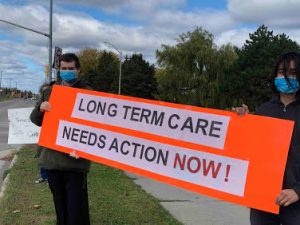
Kitchener/Waterloo

London

Public health watchdog worries delays in COVID-19 testing will lead to privatization
By Bryan Bicknell, CTV News London, October 2 2020
LONDON, ONT. — Concerns are being raised that long delays at COVID-19 assessment centres could lead to the privatization of testing.
The London Health Coalition is sounding the alarm as the province reports a record in testing backlogs.
On Thursday the backlog hit 82,000 samples, the highest since the pandemic began.
The group worries that long wait times at publicly-run assessment centres will lead to private companies moving into the market, and those who can afford to shell out extra money will get tested while everyone else waits.
While they couldn’t provide any proven examples of this happening, Jeff Hanks, coalition co-chair, believes it’s taking place under the radar.
“In the private sector it costs more. There’s less quality. It’s poorly regulated.”
And while the whole idea was to give better access to testing and take a burden off assessment centres, pharmacy testing is also a concern for the coalition.
The group sees it as a form of privatization. Co-chair Peter Bergmanis says public funding should be used to expand public capacity.
“They created the crunch of why we don’t have capacity. And yet we still know that there’s public dollars available that haven’t been spent on health care, and yet they are not pursuing the logic of why aren’t we building public capacity.”
On Friday, the Ontario government announced all of the province’s COVID-19 assessment centres would be moving to appointment only on Oct. 4 in an effort to ease the backlog.
London Health Coalition says government using pandemic to privitize healthcare in Ontario
By Devon Peacock, 980 CFPL (Radio), October 5 2020
Newmarket
Save Our Seniors: Fix LTC! rally comes to Newmarket
By, Kim Champion, NewmarketToday.ca, October 6 2020
Newmarket and Aurora’s pan-partisan protest group Common Ground Coalition will join the Ontario Health Coalition’s day of action on Thursday, Oct. 8 to demand the Ford government act immediately to address challenges within the province’s long-term care facilities.
Common Ground spokesperson Jon Aston said the coalition invites friends and neighbours “who care about the health and well-being of long-term care residents, staff, and families” to get involved in the Save our Seniors: Fix LTC! demonstration in one of three ways.
Participants can join a planned picket on Oct. 8 anytime between 11 a.m. to 1 p.m. at the corner of Yonge Street and Savage Road, at the plaza where Newmarket-Aurora MPP and Health Minister Christine Elliott’s constituency office is located.
You are asked to wear a mask, keep six feet apart from other demonstrators, and bring your own sign.
Participants can also circle the block in their vehicle around Elliott’s office anytime between 11 a.m. to 8 p.m. on Thursday. The route to follow is to travel north on Yonge, east on Mulock, south on Sandford, and west on Savage.
Organizers ask you to maintain a safe speed and watch out for children. You are encouraged to decorate your car, and honk the car horn as you circle the block once or as often as you wish.
Everyone is invited to attend Common Ground’s news conference at 12:30 p.m. Again, you are encouraged to bring a sign, wear a mask, and maintain physical distancing.
Common Ground was formed in May 2019 to raise awareness of and help put a stop to the Conservative movement’s cuts to social services and climate action.
The Ontario Health Coalition is calling on the Ford government to address the staffing crisis in the province’s long-term care homes, implement a minimum of four hours of hands-on care for residents, and end for-profit long-term care facilities.
Day of action protests are taking place in communities across the province on Oct. 8 beginning at 11 a.m. at area MPP’s offices, including a kickoff by Ontario Health Coalition members at 9:30 a.m. at Queen’s Park in Toronto.
Niagara

Thursday rally at Oosterhoff’s office focused on long-term care
By Allan Benner, Niagara Falls Review, October 6 2020
As COVID-19 outbreaks again increase at long-term care homes in Niagara and across the province, advocacy groups are renewing lobbying efforts for systemic changes they feel are needed to protect the residents of those facilities.
Despite past outbreaks that claimed the lives of about 1,900 people across Ontario, Betty Miller from long-term care advocacy group Guardian Angels said staff shortages and hours of direct resident care have yet to be addressed, despite recent government announcements of $540 million in funding for long-term care homes.
As the second wave of COVID-19 has started to impact long-term care homes, Miller said “nothing much has changed since the pandemic started back on March.”
“They’re still understaffed. They should have hired more staff back in March and April,” she said. “Don’t just start now. Now, it’s too late. People are getting sick already.”
There were five long-term care and retirement homes in Niagara as of Tuesday with outbreaks of COVID-19 including Shalom Gardens, Meadows of Dorchester, Lundy Manor, Millennium Trail Manor and Pioneer Elder Care, which is experiencing outbreaks at three of its facilities.
On Thursday, Miller will team up with Network 4 Long Term Care Advocacy Committee chair Carol Dueck and Niagara Health Coalition chair Sue Hotte for a demonstration at the Beamsville office of Niagara West MPP Sam Oosterhoff starting at 11 a.m.
Hotte said her group has been raising awareness about issues within long-term care homes with the government for years.
“The COVID-19 has exasperated everything,” she said.
In an e-mail, Oosterhoff referred to millions in investments his government has made in long-term care since the pandemic began. In March, he said the province announced $243 million in emergency COVID-19 funding for long-term care homes, supporting screening efforts, additional staff, enhanced cleaning and surge capacity.
And the recent funding announcement — including $405-million to enhance containment measures, provide staffing supports and personal protective equipment; $61.4 million for renovations in the homes to improve infection control, and about $30 million for increased staff and training — adds up to “more than a half a billion dollars we’re spending and we’re sparing no expense,” he added.
Meanwhile, Oosterhoff said a “landmark investment” of $461 million increases wages for 147,000 personal support workers and will help stabilize the workforce.
Thursday’s demonstration will coincide with rallies planned for the offices of Conservative MPPs across the province, as well as at Queen’s Park, organized by the Ontario Health Coalition.
Hotte said the Beamsville event will include a motorcade of vehicles adorned with signs and decorations sharing messages about needed improvements to Ontario’s long-term care homes.
While the rally itself will be limited to less than 25 people who will be wearing masks and socially distanced via sidewalk chalk markings, Hotte said the motorcade allows far more people to participate.
People participating in the motorcade are to meet in the parking lot at 5005 Ontario St. at about 10:30 a.m. to outfit their vehicles with signs and decorations.
While Hotte said some signs will be provided by organizers, she asked people to create their own signs to ensure there will be enough for everyone.
Ottawa
Families, health coalition demand action on long-term care
By Julie Ireton, CBC News, October 8 2020
Betty Yakimenko says her mom, Elsie Stadler, must be made of Teflon, because the Madonna Care Community resident has been tested eight times for COVID-19, and each time the result has come back negative.
Now, Stadler is preparing for test number nine, and Yakimenko hopes her mother can cheat the virus, which has been ravaging the Orléans nursing home, once again.For the fourth time since the pandemic first struck, an outbreak was declared at Madonna Care Community this week after a staff member tested positive for COVID-19. Since April 6, more than 150 residents and workers there have tested positive, and 47 residents and two staff members have died.”I’d like to know that proper protocols are being followed, in particular, PPE gear is being worn properly,” said Yakimenko who’s head of Madonna Care Community’s family council. “They have improved some stuff from previously, but I can’t get in there to see, so I don’t know.”It’s now among a dozen long-term care homes in Ottawa where outbreaks have been declared. In the past month, 20 long-term care residents in Ottawa have died, 19 at West End Villa.
Day of action
On Thursday, Yakimenko plans to stand up with other families, staff, unions and the Ontario Health Coalition in a provincewide “day of action” aimed at sending a message to Queen’s Park.
The group is calling for immediate action by the Ford government to recruit and train staff, and to improve working conditions. They’re also calling for a minimum daily standard of four hours of hands-on care for every resident.
Last week, the province announced it’s spending more than half a billion dollars to help the homes hire workers, purchase equipment and prevent infections.
On Wednesday, Health Minister Christine Elliott told reporters her ministry is trying to first limit community transmission. She also noted that hospitals in Ottawa continue to support affected long-term care homes, but she downplayed the current spread.
‘So far it’s only a very small number of long-term care homes that have been affected,’ Ontario Health Minister Christine Elliott said Wednesday. (CBC)
Minister’s response
“The spread in long-term care homes is very small. In situations where there is an outbreak, which is just one person that has COVID, that could be a staff member, it can be a resident. In some cases it’s purely staff members, which is unfortunate,” said Elliott. “So far it’s only a very small number of long-term care homes that have been affected.”Both virtual and in-person protests are planned in more than 20 locations across Ontario on Thursday.Kevin Skerrett, with the Ottawa branch of the Ontario Health Coalition, said the protest underlines the anger at a situation that hasn’t improved since the spring.”The crisis has only gotten worse in the course of the pandemic. Now we’re in the second wave, [but] the serious uptick in infection rates and the long-term care facilities in Ontario are not being looked after and coordinated in the same way as other provinces,” said Skerrett.
‘They are afraid’: Worker says staff fear showing up at West End Villa long-term care home
By Elizabeth Payne, Ottawa Citizen, October 9 2020
With 47 cases of COVID-19 among staff there, many people have been afraid to show up for work at Ottawa’s West End Villa, creating staff shortages, a worker from the Ottawa long-term care home claimed Thursday.
“They are afraid they are going to spread it to their families, so we work short every day,” said the worker who asked that her name not be used for fear of retribution. “They never have the right amount of staff to take care of residents.”
‘They are afraid’: Worker says staff fear showing up at West End Villa long-term care home
As a result, residents are suffering, says the family of a 79-year-old woman who lives at West End Villa. The woman has not received a bath or shower for five weeks, despite pleading for one, say her concerned family members.
Although workers view residents as their own family, the worker said they are not able to provide the kind of care they should.
Staff are chronically exhausted and rushed, she told a video press conference sponsored by the Ottawa Health Coalition. “They are not able to do what they need to do. They are not able to change their PPE (personal protective equipment) properly.”
There have been times when two PSWs are in charge of 60 residents at the home, she said, because so many people have called in sick. She said things have improved somewhat since the province ordered The Ottawa Hospital to take over management.
A spokesperson for Extendicare, which operates West End Villa, contradicted the worker’s claim and said the home is currently “overstaffed. That said, working in a home in an outbreak is not easy.”
The spokesperson encouraged staff to raise concerns with them “so we can see them addressed as quickly as possible.”
West End Villa is the site of the largest, most deadly COVID-19 outbreak in the province. Nineteen residents have died and 130 residents and staff have tested positive for the infectious disease since the outbreak began at the end of August.
The province ordered The Ottawa Hospital to take over management of the home and of Laurier Manor, which is also in the midst of a COVID-19 outbreak and is also operated by Extendicare.
In a letter to families of residents this week, the regional director for Extendicare said West End Villa had hired 17 new PSWs to work at the long-term care home and continues to recruit.
Extendicare said bed baths are being used in the home to limit the risk of transmission during the outbreak.
The company spokesperson said residents receive two bed baths a week, but the family of the resident say she had her hair washed after pleading for a shower, but the rest of her body was not washed.
The family said they are concerned her skin will soon begin to break down because of lack of proper care. This newspaper has agreed not to name her to protect her privacy.
Skin degradation was reported among some long-term care residents by members of the Canadian military who offered emergency assistance to hard-hit homes during the first wave of the pandemic in Ontario. In a report, military officials said soldiers were told some residents hadn’t received a bath in weeks.
Long-term care staff, family members and advocates say history is repeating itself with continuing staff shortages resulting in reduced care at long-term care homes in Ottawa and across the province.
That was the message from advocates, staff and others who took part in a province-wide day of action and called for an end to staffing shortages, better pay and working conditions for long-term care staff and minimum care standards for residents.
“The second wave is upon us and, if anything, staffing levels are worse than they were before COVID-19,” said Ed Cashman of the Ottawa Health Coalition.
“We need to be clear, without staff there is no care. In a number of homes, there is not enough staff to bathe residents, to reposition them, to give them daily care,” and other necessary daily tasks, he said. “The situation is serious and has not improved since the first wave of COVID-19 last spring.”
Betty Yakimenko, who chairs the family council at Madonna Care Community long-term care home, said families have always been concerned about the lack of staff there. During the first wave of the pandemic, when close to one-third of the home’s residents died of COVID-19, the home lost almost 60 per cent of its staff, she said.
She said there are more staff now, but still not enough, and Yakimenko is concerned about what will happen if the home has another serious outbreak.
“Is there anybody to take over? Hospitals are not going to be able to help out. We need more staff. There are no two ways about it.”
In an earlier email, an Extendicare spokesperson said the support of The Ottawa Hospital at West End Villa and Laurier Manor “helps our staff, residents and their families to have confidence that everything possible is being done to contain the outbreak.”
Oxford

Peel

By Nida Zafar, The Pointer, October 14 2020 (Please click on headline to read)
Peel Health Coalition takes part in provincewide protests over long-term care conditions
By Marta Marychuk, Caledon Enterprise, October 9 2020
The Peel Health Coalition was one of 24 chapters of the Ontario Health Coalition that took part in a day of action on Thursday, Oct. 8, to protest conditions in long-term care homes.
Rosemary Keenan, a member of Peel Health Coalition that gathered outside the office of Brampton-West MPP Amarjot Sandhu, said the event went well despite sparse numbers.
Although Sandhu was not at his office, Keenan said approximately 10 people took part in the Peel protest, including two speakers who had parents at Holland Christian Homes and The Village of Erin Meadows facilities.
The purpose of the day of action was to call on the Ford government to immediately address the lack of full-time work in long-term care and poor conditions for both residents and staff, said Keenan.
The funding and staffing announcements made by the Ford government recently increases the money but is far less than what is needed, said Keenan.
She said the government needs a clear plan to recruit and train staff, improve pay and working conditions and provide full-time work. She said, currently, there are not enough staff in some homes to provide each resident a minimum of four hours of care, per day.
“Some residents require more,” Keenan said.
The coalition has been tracking outbreaks since early March and has now counted 51 currently active outbreaks in long-term care homes and 40 outbreaks in retirement homes across Ontario.
“We had a lull in the summer, and we were waiting for the Ford government to take concrete action to shore up the staffing and care levels and prepare for the second wave. That did not happen,” said Natalie Mehra, executive director of the Ontario Health Coalition, in a statement.
“The announcements of funding and staffing in the last two weeks were late, piecemeal, and inadequate. We cannot believe that now, in October, eight months after the outbreaks began, there is still no coherent plan for long-term care in Ontario,” said Mehra.
On Sept. 28, the province announced it was investing $52.5 million to recruit, retain and support more than 3,700 more front-line health-care workers and caregivers to meet any surge in demand for long-term care homes.
“It’s the thousands of nurses, personal support workers, and other front-line workers who have made the difference in the fight against COVID-19,” said Premier Doug Ford in a statement at the time of the announcement.
Peterborough
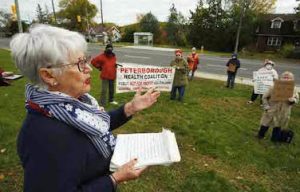
Workers urge more funding, protection for long-term care residents
By: Matthew Barker, The Peterborough Examiner, October 8 2020
The Peterborough Health Coalition held a rally outside of Peterborough-Kawartha MPP Dave Smith’s office on Thursday, calling for more funding for long-term care homes in the area and more protection for residents.
“As we all know the impact of this COVID-19 pandemic is being heavily felt in long-term care facilities,” said Charlene Avon, a board member of the Ontario Health Coalition.
“It is being underfunded, it’s been undervalued, it has been privatized and by a government that has after six and seven long months, deadly months, no plan to protect residents and staff and families.”
Robin Nelson, whose mother is in a long-term care home, said residents deserve better care than they are getting.
“My mom was in long-term care and she wasn’t getting the quality care she deserves,” Nelson said.
“Because they don’t have the PSWs there. It isn’t so much that PSWs don’t care it’s that they don’t have time to care properly.”
Donna Paris, a personal support worker at Fairhaven long-term care home, said she came to talk about the challenges that her and her co-workers face daily in long-term care.
“The last few months have been some of the most emotional and difficult times,” Paris said. “I have experienced in my 15 years as a PSW, we have lost and continue to lose residents due to COVID.”
The union wants a minimum of four hours spent per resident per day, said Melinda Whitney, a PSW at Extendicare and chief steward for the Service Employees International Union.
“Our union is advocating for a minimum of four hours a day per resident,” Whitney said. “They deserve that and I strongly believe they have been ignored and those are the ones that taught us morals and values and our strong beliefs and we have to give that back in return and give them a decent life.”
The pandemic exposed glaring vulnerabilities in the industry that the government can’t ignore, she said.
“We have all heard the horror stories about the care delivered in some long-term care homes and it is shameful, we need to do better,” Whitney said.
Smith came out to speak to protesters about their concerns.
He said a committee was formed to address the challenges that have come up in long-term care facilities since the start of the pandemic.
“There is a committee that has been formed to take a look at the challenges in long-term care,” Smith said.
A new program was also launched by the province to provide additional pay during the pandemic, he added. It should be more easily distributed because the new money is coming from the province directly rather than through the federal and provincial governments.
“The new program we have announced a week ago is all money coming from the province,” Smith said. “It should flow much quicker than what the past did. We have learned from some of the mistakes made.”
Sault Ste. Marie

Long-term care needs care now: Protesters; Day of Action urges government to boost support
By Elaine Della-Mattia, Sault Star, October 9 2020
Health-care advocates and union leaders staged an Ontario-wide protest Thursday urging the provincial government to take immediate action to address the staffing crisis in long-term care homes and implement a minimum of four hours of hands-on care for residents.
In Sault Ste. Marie, the protest and accompanying motorcade was held outside MPP Ross Romano’s constituency office.
Cathy Humalamaki, president of Unifor Local 1359, told about two dozen participants that the health-care system is broken and Premier Doug Ford’s Progressive Conservative government is doing nothing to fix it.
She said residents in long-term care homes need staff that can provide them with four hours of care a day and immediate action needs to be taken to increase pay, improve working conditions and offer full-time employment, similar to what has been done in British Columbia and Quebec.
Marie Della Vedova, of the Sault Ste. Marie and District Health Advisory Committee and representing the Algoma Family Council Coalition, said resident care should be a priority to the government.
Della Vedova said both organizations have reached out to Romano’s office to discuss the issue, but have found it difficult to get together with him.
“If you listen to our premier, he tends to think it is all under control, but it is simply not,” she said.
Della Vedova said her mother had spent time in a long-term care home before she died, adding she witnessed conditions first hand. She said there were times when there were simply not enough staff to care for residents, especially if one called in sick and others tried to make up for the shortfall.
“This is a job that is complex and demanding, both physically and emotionally,” she said. “PSWs need more regulations. They need proper training and staffing and they need to be paid accordingly.”
The groups also wants to see an end to for-profit, long-term care facilities across the province.
“We already know that there are higher levels of infections and fatalities in for-profit, long-term care homes across the province. Research has shown us. We need to expand our not-for-profit care facilities and we need more staff. This should not be run as a business,” she said.
Statistics suggest more than 1,900 Ontario residents and staff have died of COVID-19 in longterm care homes.
While the province has recently announced additional funding for long-term care homes, workers argue there is no clear recruitment plan.
In addition, the lack of full-time work and poor working conditions have also not been addressed, they argue.
The Ontario Health Coalition’s Day of Action was held simultaneously in communities across the province.
Scarborough
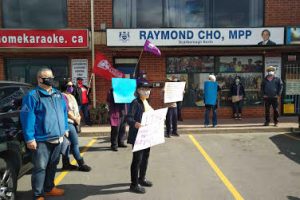
Sudbury
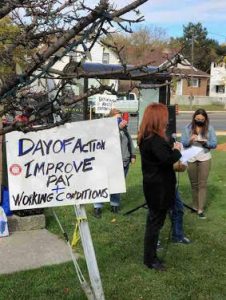
‘We want long-term care fixed now’
By: Colleen Romaniuk, Sudbury Star, October 9 2020
The Ontario Health Coalition held a province-wide Day of Action on Thursday calling the Ford government to take immediate steps to improve conditions in long-term care facilities.
Participants, including members of the Sudbury Health Coalition, health-care workers, family members with relatives in long-term care, and local MPPs, gathered for a small press conference and car motorcade outside of Pioneer Manor at 11 a.m.
They joined over 20 branches across Ontario who gathered at the same time to demand increased funding to long-term care facilities, a concrete recruitment plan for PSWs and other caregivers, and a minimum standard of care for patients.
“The purpose of this event is to tell Doug Ford and the Ford government that we want long-term care fixed now,” said Dot Klein, co-chair of the Sudbury Health Coalition.
“Our loved ones who live in long-term care are dying. Almost 2,000 long-term care residents and staff died during the first wave of COVID-19. Now, we’re into the second wave. We do not want a repeat of what happened the first time, but we’re finding out that there are outbreaks in long-term care homes already. That’s unacceptable.”
Issues in Ontario’s long-term care facilities are well-documented, and they predate the COVID-19 pandemic. Advocates have been calling for long-term care reform for well over 20 years, said Klein.
Staffing shortages, inadequate funding, a lack of full-time work for PSWs, and poor working conditions are some of the problems that chronically impact the sector.
“We want no more band-aids,” she said. “Long-term care needs a minimum care standard of four to 4.5 hours of front-line, hands-on care per resident per day. There is no approved minimum care standard now. Care is given in relation to the number of qualified staff working that day.”
Klein said it is not uncommon to have a PSW caring for “not just eight residents, but 10, 12, 16 – even 20 – residents per day.”
COVID-19 has exacerbated these issues, putting some of the most vulnerable members of our communities at increased risk.
“This issue was urgent years ago,” said Sudbury MPP Jamie West. “Long before I was a politician, they were talking about four hours of hands-on care for seniors. COVID-19 put a lens on it and highlighted how bad it was. This is an opportunity, with public support and the willpower of government, to get it done.”
West said it “should be the legacy of the 42nd parliamentary sitting in Ontario that we finally take care of what’s happening in long-term care homes.”
Although the Ford government recently announced an additional $540 million in funding to protect residents and staff in long-term care homes, the OHC said that “the money is far less than what is needed.”
The organization was also critical of the fact that the provincial government has not established a clear recruitment plan nor committed to addressing a lack of full-time work and poor working conditions.
On Oct. 5, the province announced it would be tightening restrictions on entry into longterm care homes to include only staff, essential visitors, and two essential caregivers per resident who must register to gain access in regions hard-hit by an increase in positive cases of COVID-19.
Lynn Logtenberg, whose father resides in long-term care, shared her experience with lockdowns during the pandemic.
She said her dad tested positive for COVID in April, and she and her sister have been designated as essential caregivers, visiting each day to help him eat lunch and dinner.
“When Premier Ford’s government shut down the nursing homes during the first wave for residents’safety, it failed to consider the emotional effects isolation cause,” she said. “We are now wondering if the mental effects of isolation are better or worse for our loved ones in the long-term care homes.”
She noted the virus entered the homes even though family was initially prevented from visiting during the first wave.
“Despite the fact that we last visited our dad on March 13, our dad was one of the residents who did test positive on April 26,” she said. “If the nursing home had had enough staff, perhaps we would have received a call before it reached the media.”
Logtenberg’s father was isolated until he received two negative test results.
While the sisters said that is understandable, their father was struggling. When hiring one-on-one care for their father didn’t work, staff at the nursing home had to medicate him to keep him comfortable.
“Our dad lost a lot of his abilities.
He needed comfort, and we were prevented from giving him that,” she said.
“He used to be happy. He used to do things independently. When we were let back into the nursing home, he was failing to thrive. He wasn’t eating. He wasn’t the same, and he’s still not. Most residents lost weight. We believe our dad went through withdrawals due to being medicated. He often refuses to take his meds – he states they are trying to kill him with drugs. This is not a shame on the nursing home. This is a shame on our government.”
Under the new restrictions on entry, many more families are being separated for a second time.
Kim Evans, whose mother is a resident at Extendicare Falconbridge, is currently awaiting the results of her COVID-19 test so that she can visit her mother, who was recently released from the hospital after doctors determined they couldn’t do any more to treat her congestive heart failure.
“I have six brothers and four sisters, and none of them are able to see her,” said Evans, even though the doctor estimated that her mother had about two weeks left to live.
“I wasn’t told about being able to be designated as an essential caregiver – I found out by reading an article online. That’s when I got in touch with the director and was put in touch with someone who gave me a package so that I could get in.”
According to the communications team at Extendicare Falconbridge, in order to become an essential caregiver an individual must be over 18 years of age, conduct and pass a self-screening for potential COVID-19 symptoms before arriving at the home, and comply with infection prevention and control protocols, including proper use of PPE.
“The government of Ontario revised its directive on visitation at long-term care homes in areas deemed to be high risk. While we are not seeing cases rise as severely here as in parts of southern Ontario, our area has been identified as having higher community spread,” said a spokesperson for Extendicare Falconbridge.
“We know that as cases of community spread increase, so does the virus’s opportunity to enter long-term care environments. The new visitor policies are in place to protect our residents as much as possible during this resurgence.”
The nursing home is still allowing palliative care visits for residents nearing the end of their lives. However, Evans said residents must meet certain criteria to have access to those visits.
“We’re not allowed to see her because she has to be at 20 per cent capacity,” said Evans. “I was told by the doctor that took her from the hospital to the nursing home that she was at 20 per cent, but when she got there, it was a totally different story.”
There are approximately 78,000 seniors in 626 long-term care homes throughout the province.
In a Zoom press conference that coincided with the Ontario Health Coalition’s province-wide rallies, Liberal health critic and Ottawa South MPP John Fraser estimated that Ontario needs to hire 10,000 to 15,000 workers in long-term care homes right now.
There is one long-term care home in Ottawa, he added, that has a single PSW working with 30 residents who have tested positive for COVID-19.
“We heard talk about those that are disproportionately affected by the coronavirus,” said Logtenberg. “However, it seems Premier Ford is failing to consider how longterm care homes and residents of those homes have been affected to date, and will continue to be affected without more funding for more qualified PSWs.”
Change is needed now, she said, “so no other resident lives or dies in loneliness.”
Protests call for LTC Reforms (Video)
By CTV Northern Ontario
Thunder Bay

Rallies calling on Ford to make changes to long-term care now
By Doug Diaczuk, TB News Watch, October 8 2020
Health coalitions and unions held rallies across the province on Thursday calling on the provincial government to bring in more personal support workers to provide proper care to residents in long-term care.
THUNDER BAY – For years health coalitions, unions, and personal support workers have been calling on the provincial government to address issues in long-term care, and with the COVID-19 pandemic claiming nearly 2,000 lives, those calls continue to get louder.
“We are here today to join 23 other local coalitions across the province and the Ontario Health Coalition to tell Doug Ford that his response to the deaths of 1,935 residents, nine staff, and two family members is absolutely insufficient,” said Jules Tupker, co-chair of the Thunder Bay Health Coalition. “He’s done absolutely nothing to address the issues in long-term care.”
Rallies were held in cities across the province on Thursday, including Mini-Queen’s Park in Thunder Bay, calling on the Ford government to provide more incentives for PSWs to work in long-term care.
“There’s just not enough staff. The staff are not there,” Tupker said. “They don’t have enough time to do the job they want to do. Staff in long term are passionate and compassionate people, they want to help the people in long-term care, they just don’t have the time. That’s always been a problem.”
Tupker added the provincial government needs to institute a minimum of four hours of care per resident, per day in order to allow the workers to do the job they were hired to do.
“In other words, to create a home for the residents in long-term care and they can’t do that now because there’s just not enough time for them to do that,” he said.
Lina Moore, a personal support worker in Thunder Bay, said she knows the importance of the work PSWs do in long-term care and need of four hours of care at the bedside. She said she comes home every day after a shift exhausted from trying to care for so many residents with not enough time.
“It’s not a very good feeling to go home and I tell my family that I don’t think I did the best job I could have done if I had the tools and if I had the staff,” she said. “It’s an awful feeling. It breaks my heart.”
“We’ve been after the government for over 10 years that this is happening, and now we are in a pandemic and it’s just gotten worse. There is not enough staff on the floor to take care of the residents and their needs every day.”
Long-term care homes in the province were hit particularly hard during the COVID-19 pandemic last spring, with the majority of more than 1,900 deaths happening in private, for profit facilities.
“We want Doug Ford to start moving toward making those homes public,” Tupker said.
But the issues affecting long-term care all long-term care homes continues to be staffing shortages, which Tupker said is due in part to a lack of incentives for people to enter and stay in the profession.
The Ford government recently implemented a $3 wage increase for PSWs in long-term care, but Tupker said that is a short-term solution.
“What’s the incentive to go back to school and take a PSW course when I know my wages are not going to $24 an hour, they are going to be $21 an hour and I don’t have enough time to do the job properly. It’s a joke,” he said.
“It’s an incentive for the people who are still there to say please stay, because we can’t afford to lose any more people.”
And with the province seeing surges in COVID-19 cases again, the Health Coalition is worried long-term care homes will once again be vulnerable to outbreaks and more lives will be lost, which is why action needs to be taken now.
“I hope the government can hear us and say, let’s do something,” Moore said. “It’s only going to get worse. What frightens me is COVID, the second wave, we can’t lose any more lives.”
Toronto

Need for PSWs, long-term care home workers immediate — OHC
By PJ WIlson, Sudbury Star, October 8 2020
Ontario needs to hire between 10,000 and 15,000 workers in long-term care homes “right now,” according to Liberal health critic John Fraser.
Speaking in a Zoom news conference Thursday, Fraser said in one extreme case from Ottawa, a long-term care worker is looking after 30 senior patients with COVID-19.
And the problem, he says, is only getting worse, as more personal support workers (PSWs) and other employees at long-term care homes leave their positions for better pay and working conditions in other fields.
Fraser was one of several speakers at the news conference held by the Ontario Health Coalition (OHC) on a day of action urging the Doug Ford government to “take immediate action to address (the) staffing crisis” in long-term care homes.
While a motorcade encircled Queen’s Park in Toronto and protests were held at 24 other locations across the province, including Sudbury, OHC executive director Natalie Mehra said the coalition “has been waiting all summer” for the province to react.
Six months ago, she noted, British Columbia took steps to hire thousands of workers for long-term care homes in that province, while Quebec announced four months ago it would hire 10,000 workers..
“In Ontario, the staffing crisis is worse,” she says. “It is just beyond words.”
The fact one Ottawa long-term care home has a single PSW working with 30 residents who have tested positive for COVID-19 is “just unspeakable.
“There is inadequate staffing, no intervention early enough . . . and residents are wandering in and out of the rooms” of residents with COVID-19, she says.
“At this point, we would have expected to see immediate intervention, improved staffing,” sufficient personal protective equipment for all staff, proper isolation and testing procedures in place, Mehra says, but that is not the case.
“We are calling on Ford to get his act together, get a plan in place and get staffing to safer levels.”
“It’s really appalling,” Dr. Amit Arya agrees.
He says 95 per cent of staff in an OHC survey reported staff shortages across the province, and “the province has done nothing to date to address these staffing shortages.”
Worse, he says, is that many of the homes have had multiple complaints filed with the province over the years, but the province scaled back inspections after the Ford government took power.
And while staff are working double shifts, privately owned long-term care homes have continued to pay out dividends to shareholders throughout the crisis, he says.
“We need the government to act now,” Arya says, calling for increased surprise inspections of homes, with the results of those inspections being made public.
Early in the pandemic, when military personnel were sent to a number of long-term care homes, they reported numerous shortcomings of the facilities.
But the province, Arya says, didn’t learn from that experience.
At this time, 50 long-term care homes across the province are reporting outbreaks, Mehra noted, and “40 or so” retirement homes are in the same situation.
But the province, she says, has still not come up with a plan.
“It’s hard to understand how we find ourselves where we are,” Fraser said. “We are so unprepared” for the growing second wave of COVID-19.
“We didn’t learn from our mistakes at the beginning.”
Temiskaming-Cochrane MPP John Vanthof admitted he “job shadowed” a PSW last November, before the pandemic struck.
“It was impossible to do the work that needed to be done,” he says.
He also said his wife, who works as a waitress, works with a number of former PSWs who left their positions because the money and the working conditions were better in a restaurant.
More than 1,900 residents and staff in long-term care have died of COVID-19, but participants in the news conference said the province has only offered “piecemeal” solutions and not a full plan to deal with the situation.
Adding the needed staff, Jane Meadus of the Advocacy Centre for the Elderly said, is something that should have been done long ago.
“They missed the boat by not getting people trained over the summer,” she says, or even earlier when people were being laid off from their jobs or students were no longer able to attend classes.
And while almost 2,000 people have died in long-term care homes, she says, the province continues to put many times more funding into hospitals than into long-term care.
There are 626 long-term care homes in the province, so even a recently announced increase of 2,000 PSWs “will only mean three per home, and that’s once they graduate,” Fraser says.
By Workers’ Forum, October 13 2020
Twenty-five communities across Ontario held events on October 8, the Day of Action called by the Ontario Health Coalition (OHC) for improvements in long-term care (LTC) in Ontario. People set up pickets in front of the offices of MPPs, held rallies and car cavalcades, including one at the provincial Legislature in Toronto.
Despite eight months’ experience since the onset of the pandemic and the dismal failure of Ontario to protect seniors and their caregivers throughout the first wave, the situation in the LTC system in Ontario remains dire. The demands raised across Ontario on October 8 included calls for immediate government action to address staffing shortages, to enforce the minimum standards of care recommended by the Registered Nurses’ Association of Ontario and others, for adequate protection for frontline health care workers, and to put an end to for-profit delivery of long-term care services.
Speaking at a press conference at Queen’s Park in Toronto, OHC Executive Director Natalie Mehra said there are currently large COVID-19 outbreaks in Toronto and Ottawa and increasing outbreaks in regions across Southern Ontario. “The Coalition has been tracking outbreaks since early March and has now counted 51 currently active outbreaks in long-term care homes and 40 outbreaks in retirement homes across Ontario,” she said.
Jane Meadus, a lawyer with the Advocacy Centre for the Elderly, echoed the concerns about inadequate care in her statement. She said: “Residents’ conditions have deteriorated as a result of isolation, loneliness, and inadequate care. Family caregivers cannot be shut out again and staffing and care levels must be addressed as a priority.”
Dr. Amit Arya, a palliative care physician in long-term care homes and an OHC board member said: “The second wave is already impacting long-term care facilities. Every day of inaction counts. Ontario needs to change the way we are addressing this crisis situation now.” Dr. Arya went on to call for a legislated staffing standard that would result in four hours of hands-on care, and noted it needs to be enforceable. He said that the government needs to put its full weight and resources behind reaching that target.
“We need to ensure that all the staff have access to full-time work, a living wage, sick leave and are only in one long-term care home. Residents need their family caregivers and that needs to be protected in law. Medical teams need to be ready to stand by and provide support and intervention early when there are outbreaks,” he stated.
Below Workers’ Forum reports on a recent briefing in which the OHC sheds light on current outbreaks in LTC facilities and staffing shortages and government attempts to disinform the public with its numerous recent funding announcements.
Windsor

Ontario Health Coalition rallies hit Windsor calling for new standards in long-term care homes
By Ricardo Veneza, CTV Windsor, October 8 2020
WINDSOR, ONT., — Rallies across Ontario, including in Windsor and Chatham, are calling for the Ford government to end private ownership of long-term care homes and implement a standard of a four-hour minimum of hands-on care for clients, as the province comes to terms with a second wave of COVID-19 cases.
On Thursday, the Ontario Health Coalition organized rallies across the province to call for action concerning staffing levels in long-term care homes (LTC).
“The government needs to act,” said Tracey Ramsey, co-chair of the Windsor-Essex chapter of the Ontario Health Coalition. “They can say all the things that they want but, if they don’t implement things and put policies and legislation in place we aren’t going to see any systemic changes.”
Ramsey says the Ford government’s recent announcement on wage enhancements and staffing don’t go far enough to addressing the issues in LTC’s.
Last week, the premier announced a temporary pay bump for nearly 147,000 personal support workers in the province.
However, Ramsey says the pay raise does not address the chronic staffing shortages unions have been flagging for years.
“We don’t see changes to staffing levels, we don’t see a recruitment policy coming from the government, we don’t see any plan at all,” said Ramsey. “There is no excuse for the government not to have a plan given what we’ve been through and the deaths that we’ve had in long-term care.”
Ramsey led a group of union members, healthcare professionals and other activists for a rally Thursday morning outside of the Heron Terrace long-term care home in Windsor, which was the location of a significant COVID-19 outbreak earlier this year.
HEALTH COALITIONS ACROSS THE PROVINCE FIGHT FOR LONG-TERM CARE HOMES
By Rob Hindi, iheartradio, October 8 2020
The co-chair of the Windsor Health Coalition believes the province can do better.
Speaking on AM800’s The Dan MacDonald Show, Tracey Ramsey says the province needs to look at staffing levels immediately at long-term care facilities across the province.
“We’re calling for immediate action by the Ford government to recruit and train staff, improve pay and working conditions and provide full time work,” says Ramsey. “If we look at what’s happening in Quebec and B.C., they’ve already done this, months ago four and six months ago. Ontario has yet to act and there is no excuse for this further delay.”
Ramsey says they’re also fighting for better conditions inside the homes and is asking the province to eliminate for-profit homes. She says long-term care residents and their families deserve better.
“The conditions of work are the conditions of care for our loved ones and they can no longer be in vulnerable positions because of the in action of this government,” Ramsey adds. “The other thing we’re calling on is the implementation of a minimum care standard of four hours of care, hands on care per day, per resident.”
She feels the province is in an emergency situation.
“There is no way we can continue on past this pandemic into this second wave without these things being addressed and when we see other provinces doing it, where is the Ford government,” says Ramsey. “Why are they not acting to save lives, to recruit and retain workers, to make sure that the staffing levels are where they need to be.”
Coalitions across the province including Windsor took part in a Day of Action on Thursday for long-term care homes.
Windsor’s Day of Action included a car motorcade rally outside on Heron Terrace on McNorton Street.
PHOTOS: Day of Action demonstration for long-term care
By Dax Melmer, Windsor Star, October 8 2020
Durham and Oakville also participated.


